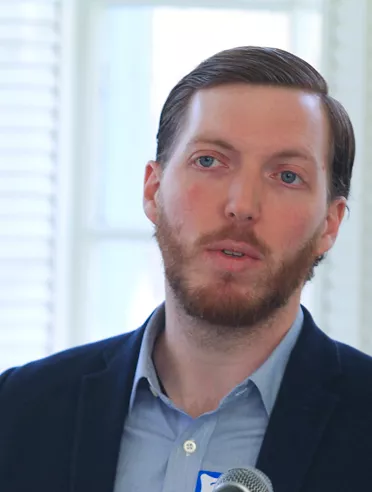Alum Profile: Don Fahey Embarks on a New Phase of His Career Exploring a New Phase of Matter

Most people think of matter as existing in one of three phases – solid, liquid or gas. A few of us even know about plasma, the name given to the unique properties of certain gases at very high temperatures. In 1995, a group of scientists affiliated with the National Institute of Standards and Technology (NIST) confirmed the existence of another phase of matter, the Bose-Einstein Condensate, or BEC. By cooling certain gases down to extremely low temperatures—using lasers and other instruments—physicists create a condensed version of the gas with very little energy.
Don Fahey, who received his Ph.D. in physics in 2014 from Bryn Mawr College, is a post-doctoral researcher at the Joint Quantum Institute, a collaborative program between NIST and the University of Maryland, College Park. He is currently doing experiments focused on precision measurements using this relatively new phase of matter. “Physically, all the atoms assume a general identity, they occupy the same spot in space,” Don explains. “The atoms are all overlapped and spread out into a new phase of matter where you have what’s called coherence.” The benefits of BECs are particularly important at NIST, the governmental organization responsible for setting the standards of measurement in the U.S., because “BECs allows you to reduce the noise that is an issue when you need to make precise measurements.” Currently, Don is working with a team trying to do atom incrometry, “making measurements below the theoretical limit of what is possible – so, the most precise measurements you can make.”
Don initially came to Bryn Mawr with the intention of becoming a physics professor. Having earned his undergraduate degree at a large, tier-1 research institution, he wanted to explore options beyond research. “I came to Bryn Mawr wanting to teach. I wanted to learn new strategies and best practices for teaching physics and thought that the liberal arts environment would be best for this. Not to mention, Bryn Mawr has a long tradition of placing its physics graduates in small liberal arts teaching positions.” While at Bryn Mawr, Don also took advantage of the dean’s certificate in pedagogy, a series of workshops that further underscore the College’s commitment to training its students in the art of teaching.
But something happened during his time at Bryn Mawr. Working in the labs of Physics professors Elizabeth McCormack, Peter Beckmann and Michael Noel, Don felt the pull back to research. “I became a lover of research and wanted to continue it. I found it enriching and fulfilling to be a part of the greater scientific conversation that goes on, writing papers and going to conferences. While I haven’t lost a love of teaching, I decided I would like to do research.”
Though Don’s goals shifted during his time at Bryn Mawr, the diversity of his experiences and training enabled him to pursue many different career options. “Bryn Mawr offers an excellent opportunity to develop as an independent researcher. You are given more independence than at larger institutions where you might work on a project with many other people. Your contribution will be significant and you will learn a great deal, but you won’t necessarily have to think about the project as a whole. The scope of your work will be deep but narrow.”
Because of the small size of Bryn Mawr’s program, its graduate students play an important part in the laboratory and take on a wide variety of roles. “The professors provide support and guidance, but I was given free rein of a lab. If I needed to build a circuit, then I learned circuit building and built a circuit. When I needed to learn how to program to do a simulation, I learned the simulation and wrote the program. At Bryn Mawr you have to learn how to do it all and so what you end up with is breadth in your skill set.”
Don also credits the professional development skills he learned at Bryn Mawr under the mentorship of a caring faculty. “The faculty in the physics department encouraged us to go to conferences. As soon as I started doing research, I started to attend annual conferences and network. I always made a huge effort to meet new people and to reconnect with people I met at previous conferences – from having a quick conversation to going for a meal or a drink. By the time I was ready to graduate, I had a number of people who were interested in talking to me about possible opportunities.” Indeed, it was a fellow graduate student Don met at one of these conferences who put him in touch with the lab at NIST in which he now works. “As a young professional, I can’t emphasize enough how important it is to go to your professional meetings and to maintain those connections and to meet people.”
Don was able to share some of this advice with current graduate students as a panelist at the recently convened 2016 Graduate Career Symposium at Bryn Mawr College organized by the Graduate Student Association and the Dean of the School of Arts and Sciences. After finishing his post-doc, Don hopes that the research experience he has gained will help him land an academic post in a setting similar to Bryn Mawr—where teaching and research are equally valued.
